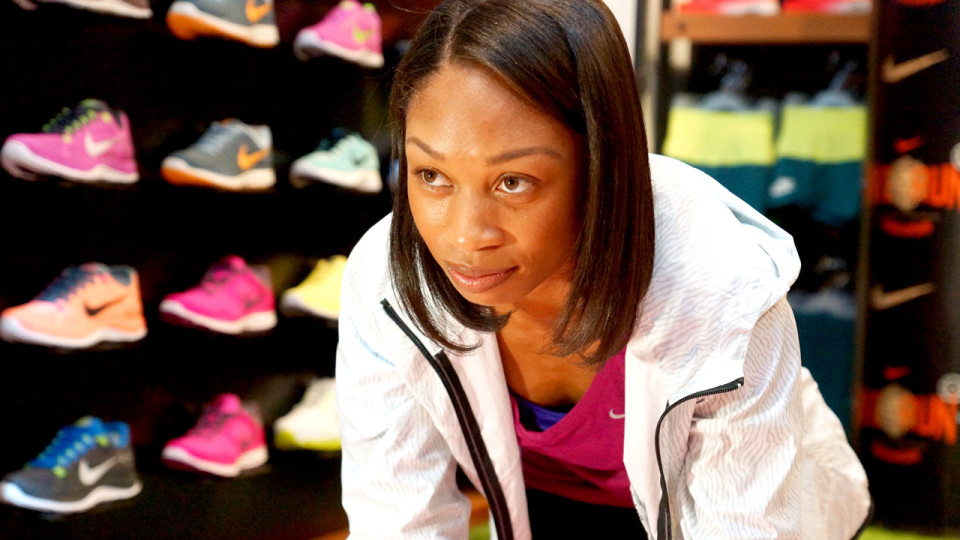World Champion and multiple Olympic gold medallist Allyson Felix is in Singapore to cheer on runners at We Run SG 2013. She was at Raffles City on Saturday morning for a meet-up with aspiring young local runners from the Singapore Sports School.
For a shining talent with 4 Olympic Gold medals under her belt, Allyson had an incredibly down-to-earth and friendly personality. With warm smiles and easy laughter, Allyson took the time to give some running tips, and even shared her running secrets and techniques with the star-struck students.
RunSociety had the privilege to sit down and talk to Allyson on dealing with her recent injury, Olympic aspirations, her favourite kind of ice cream and everything in between.
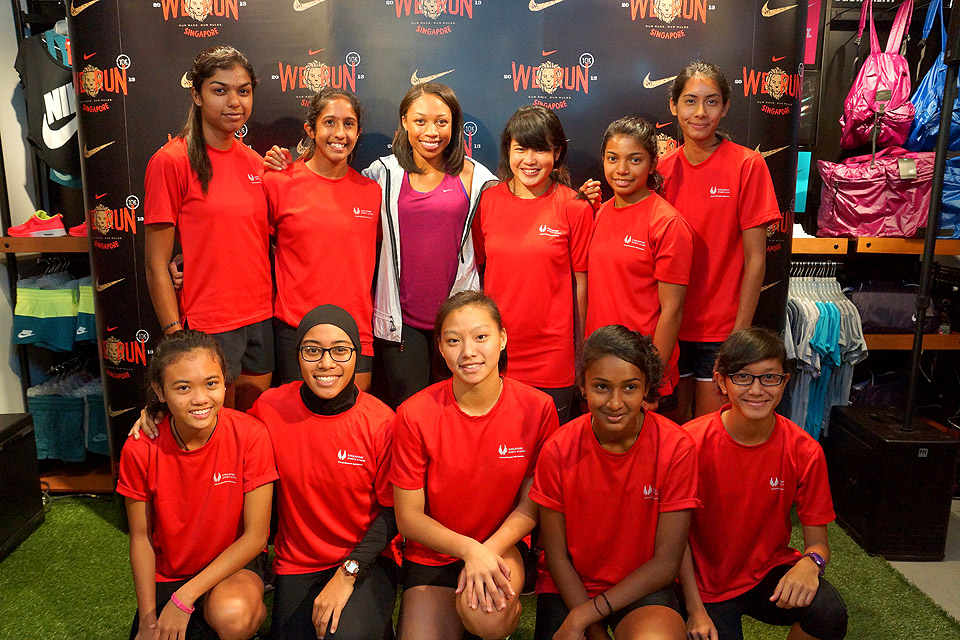
You’re here to encourage the runners at We Run SG tomorrow. What about yourself? How do you motivate yourself to go further and faster?
It’s all about going through the process of setting goals, trying to challenge myself and push myself to do more than I even thought was possible. That’s something I do on a weekly basis, on a monthly basis, with logging my workouts and things like that. The rule I’m going by now is to always go further, so I’m really excited to challenge myself. Whenever I do a workout, I always push a little bit more, and go a little further. And I’m really excited to motivate all the runners at tomorrow’s We Run SG 2013.
Could you share with us what’s your training like during your peak season?
During peak season, I training around five or six times a week, for about five hours a day. I spend 3 hours on the track. I normally do ballistics sprint work, and then I’ll do 80s, 150s, 250s 350s all out, and then I end with some recovery.
After that, I take a break and go to the gym and spend a couple of hours there with lots of body weight exercise, lots of things with movement, and lots of biometrics.
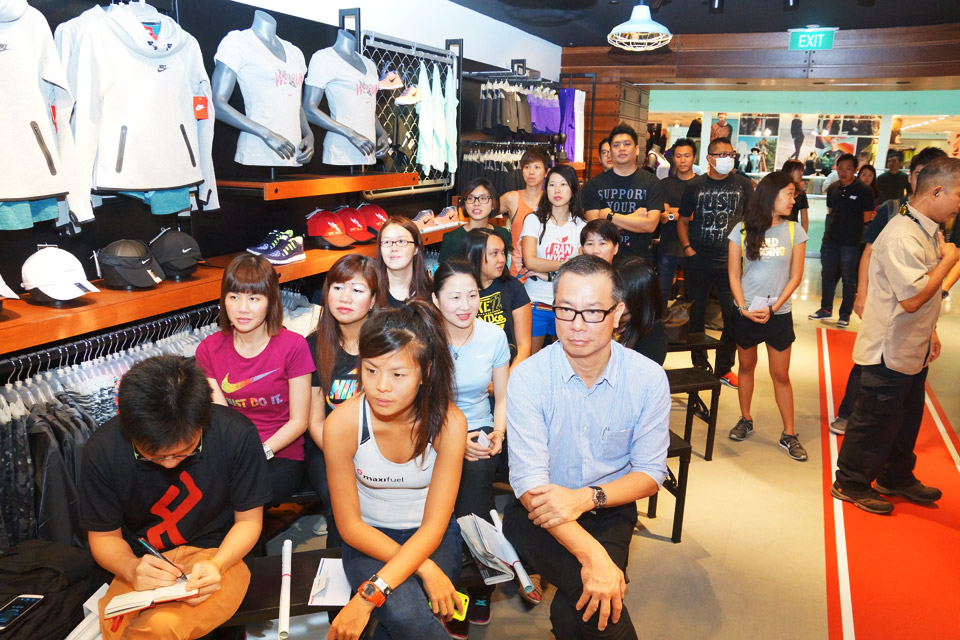
How do you maintain your fitness during off peak season?
I don’t. (Laughs) When I’m not in season, I normally have a month, sometimes a little more, and I don’t do any running or exercise. I give myself and my body a break, because I think it’s really necessary. You do so much training all year long and there’s so much pounding on your body. You have to let your body recover. For athletes, it’s hard to step away and take a rest, but I feel it’s really necessary.
Do you have a special or favourite memory that you have from your victories and podium finishes?
My favourite would be my 200M gold medal from London Olympics 2012. It was my third time attempting the 200M, and it was really all about the journey; the ups and the downs I had right up to the Olympics. I had silver medals from the previous two (Athens 2004 and Beijing 2008) Olympics, so finally, it was my time that everything came together.
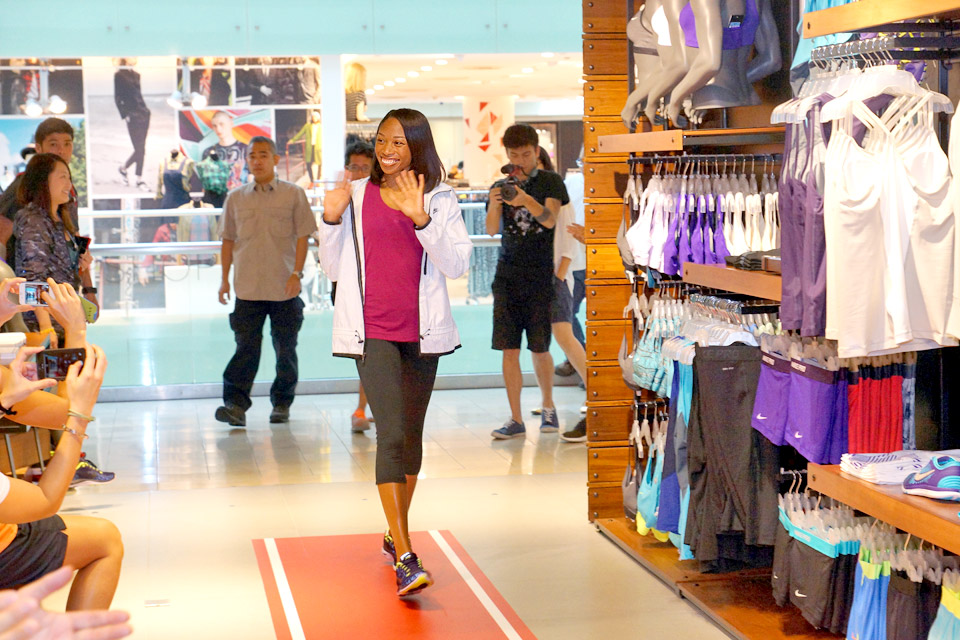
Unfortunately, you’ve been out for a couple of months with a major hamstring tear. How were your feelings following this injury?
I was disappointed I wasn’t able to perform to my best ability. I really felt like I had a good performance to come out for the final. It was really just so frustrating. I have never dealt with such an injury, so it was very new to me. But I’ll just pick myself up and keep on going.
Is there any form of exercise you do while you’re recuperating?
Yes, but it’s difficult. You do a lot of tedious work, a lot of simple things. I have to go back to the basics, and its lots of strengthening of isolated muscles. But it’s been going well and I’m really excited to go back to my normal training!
An injury is probably one of the worst things that can happen to any athlete. What advice would you give to athletes who suffer from a major injury such as what happened to you?
Don’t rush, and take it slowly. It is better to come back as strong as you can, rather than to come back with a repeat problem. You have to really understand why your injury took place and take precautions.
It could be that you may need more weight training, or more stretching, or anything. So really try to find out what why you got injured and try to prevent it in the future.
What about your own future expectations for Rio Olympics 2016?
I love everything about the Olympic spirit. I think there’s always the goal of the Olympics, and I work backwards from that. That’s how I do it. I know I’m going to be doing the 400M, 200M and 100M, and I’m open to doing other events. Each year to me is a stepping stone, and I think getting back on track after my injury is very important.
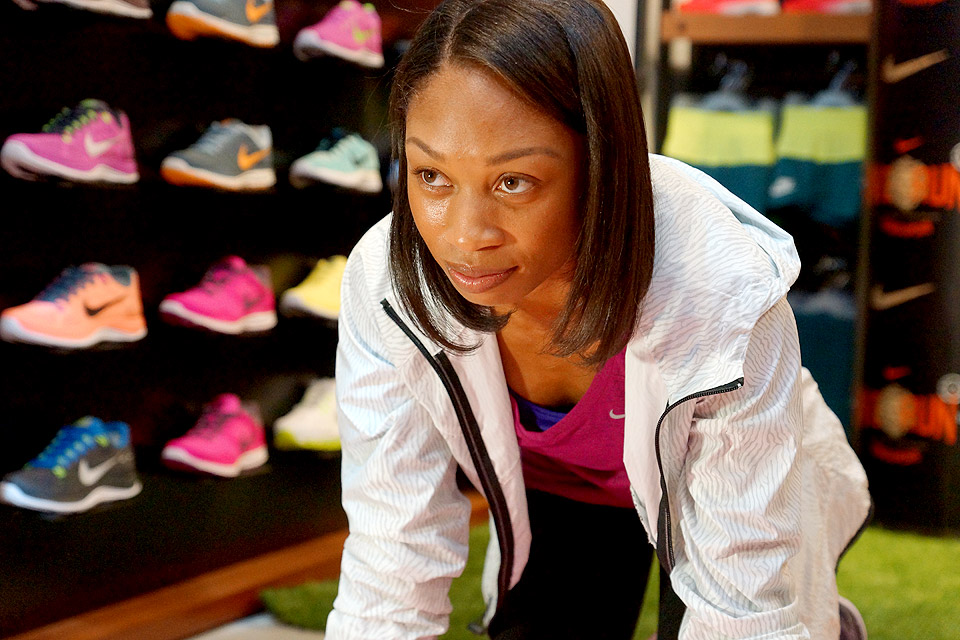
You’ve been a great role model for people all around the world. So many young children see you as a role model and inspiration. What do you think of that?
It’s so cool. I remember when I was that age looking up to my own role models and being inspired by them. For me, it’s an honour and a really special responsibility. I have a passion for kids, I’ve always loved kids, and any time I can to talk to them, and relate to them, it’s a really cool opportunity. I think it’s so important to reach kids at a young age, to explain to them about the journey, about going through the ups and downs. It’s not always going to be straight all the time. I think [track and field] is an amazing sport, and teaches them a lot of life lessons.
You’re also part of the USA’s Anti-Doping Agency’s “Project Believe” program, and you believe strongly in anti-doping. Could you explain your views on this issue?
The main idea is just saying that “I’m available for more testing”. I want to step up and be a role model in anti-doping. That’s something that I’ve always been an advocate for, and I feel that’s very, very important especially with the current situation of where sport is right now.
What is your approach to nutrition and what is your diet like?
I’ve actually made the decision not to take any supplements. I take everything I need from my food, and it’s very important to me not to take any risks. I eat a high protein diet in general, like salmon and steaks. But I love ice cream! Oatmeal cookie chunk ice cream from Ben and Jerry’s is my absolute favourite. I’m not the type of person who can keep a straight diet, so I keep my portions in check and eat everything in moderation. I try to have enough vegetables and fruits and things that will fuel my body to give me the energy to train really hard.
Is there any parting advice for all the aspiring athletes out there?
I think the really important thing is to be patient and enjoy your athletic journey. I think in this day and age, everything is about doing well right now and having instant success. But it’s really a process of hard work and training, and I think that’s an important lesson to pass on to all the younger athletes today.
Allyson Felix will be making a special appearance at the Nike We Run 2013, which takes place on 3rd November 2013.



